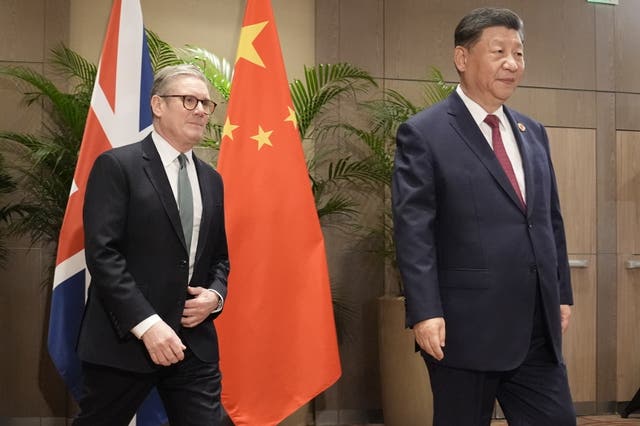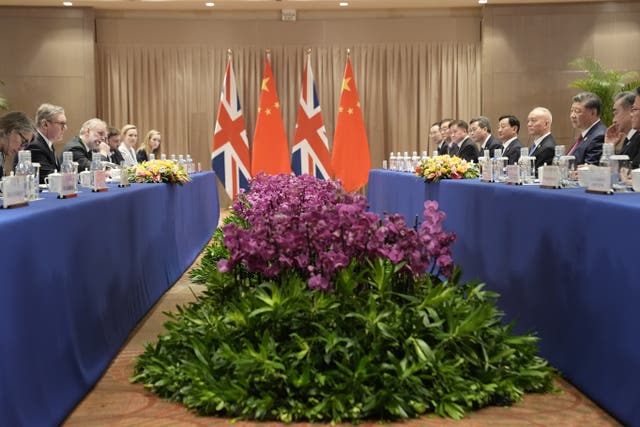Sir Keir Starmer has said he told Xi Jinping he wanted “respectful” relations with Beijing as he became the first prime minister to meet the Chinese president since 2018.
The Prime Minister raised the case of detained pro-democracy activist Jimmy Lai in a sign he was prepared to challenge China over human rights abuses, but he also signalled a desire for greater business co-operation.
Sir Keir also suggested a full UK-China meeting in London or Beijing as part of his desire for “consistent, durable, respectful” ties between the two countries.
He also told the Chinese leader that he “wanted to engage honestly” on issues where the two nations disagree, “including on Hong Kong, human rights and Russia’s war in Ukraine”, according to a Downing Street spokesperson.

The pair met in Brazil, where both leaders are attending the G20 summit.
Sir Keir said a “strong UK-China relationship is important for both of our countries” and for the “broader international community”.
The UK-China relationship has deteriorated in recent years, with concerns over security, human rights and the sanctioning of Westminster parliamentarians souring ties with Beijing.
Despite the renewed engagement by the Labour administration, the relationship is still a long way from the “golden era” sought by the Conservatives under David Cameron and Theresa May.
The Prime Minister told the Chinese leader: “We want our relations to be consistent, durable, respectful, as we have agreed, avoid surprises where possible.”

He added: “The UK will be a predictable, consistent, sovereign actor committed to the rule of law.”
Sir Keir’s meeting followed Foreign Secretary David Lammy’s visit to Beijing in October for talks with counterpart Wang Yi.
The Prime Minister told Mr Xi: “I’m very pleased that my Foreign Secretary and foreign minister Wang met recently to discuss respective concerns including on human rights and parliamentary sanctions, Taiwan, the South China Sea and our shared interest in Hong Kong.
“We are concerned by reports of Jimmy Lai’s deterioration.”
It was also agreed that the Chancellor Rachel Reeves should visit Beijing next year to discuss financial cooperation with vice premier He Lifeng.
According to a readout of the meeting issued by Number 10, the Prime Minister “said that he also wanted to engage honestly and frankly on those areas where we have different perspectives, including on Hong Kong, human rights and Russia’s war in Ukraine”.
The readout states that discussions touched on “trade and investment, health, education and other areas of mutual interest”.
They also discussed the climate, on which “both said that this should be high on the agenda and there was more work to be done to accelerate global progress towards net zero,” according to a Downing Street spokesperson.
Meanwhile, a No 10 spokeswoman told reporters: “We’ve consistently said when it comes to China that it is important to engage seriously and pragmatically, and that involves challenging (the Chinese) where necessary.”
She added: “The Prime Minister believes that it’s as important, as a serious government, to engage with China given the size of the economy and its position on the world stage.
“His priority is on pursuing pragmatic and serious diplomatic relationships.”
Speaking through a translator, Mr Xi told Sir Keir: “China and the UK have broad space for co-operation across various domains, including trade, investment, clean energy, financial services, healthcare and improving our peoples’ well-being.
“We should take fostering greater development, better serving our peoples and contributing more to the world as our goal.
“Live up to our strategic partnership and commit to mutual respect, openness, co-operation, exchanges and mutual learning for shared benefit … in doing so we will break new ground in the China-UK relationship amid a changing world and better underscore our relationship’s relevance for the times and its significance for the world.”
The President also appeared to repeat Labour’s Government messaging, as according to the translation he said that the new Government is “working to fix the foundations of the economy and rebuild Britain”.




Why are you making commenting on The Herald only available to subscribers?
It should have been a safe space for informed debate, somewhere for readers to discuss issues around the biggest stories of the day, but all too often the below the line comments on most websites have become bogged down by off-topic discussions and abuse.
heraldscotland.com is tackling this problem by allowing only subscribers to comment.
We are doing this to improve the experience for our loyal readers and we believe it will reduce the ability of trolls and troublemakers, who occasionally find their way onto our site, to abuse our journalists and readers. We also hope it will help the comments section fulfil its promise as a part of Scotland's conversation with itself.
We are lucky at The Herald. We are read by an informed, educated readership who can add their knowledge and insights to our stories.
That is invaluable.
We are making the subscriber-only change to support our valued readers, who tell us they don't want the site cluttered up with irrelevant comments, untruths and abuse.
In the past, the journalist’s job was to collect and distribute information to the audience. Technology means that readers can shape a discussion. We look forward to hearing from you on heraldscotland.com
Comments & Moderation
Readers’ comments: You are personally liable for the content of any comments you upload to this website, so please act responsibly. We do not pre-moderate or monitor readers’ comments appearing on our websites, but we do post-moderate in response to complaints we receive or otherwise when a potential problem comes to our attention. You can make a complaint by using the ‘report this post’ link . We may then apply our discretion under the user terms to amend or delete comments.
Post moderation is undertaken full-time 9am-6pm on weekdays, and on a part-time basis outwith those hours.
Read the rules hereLast Updated:
Report this comment Cancel